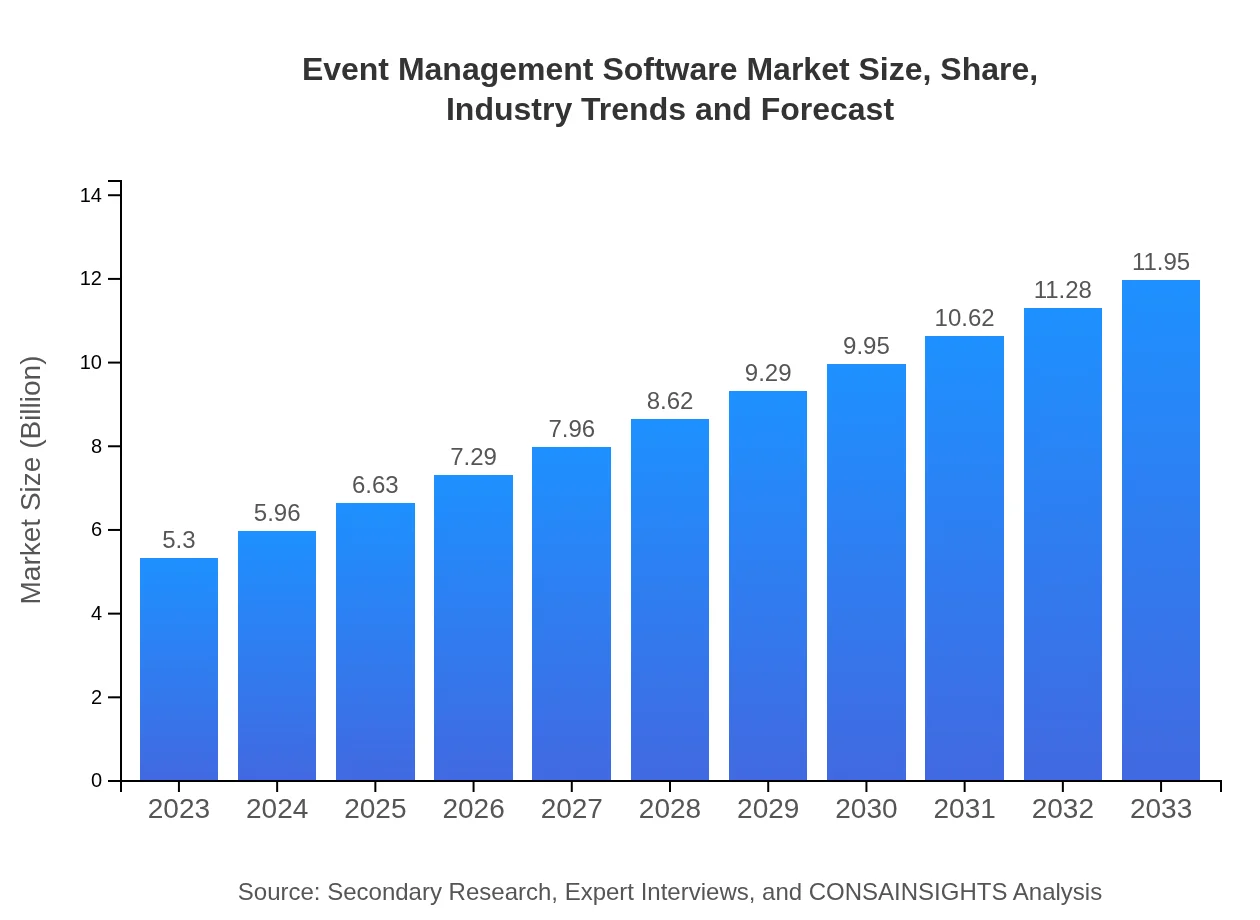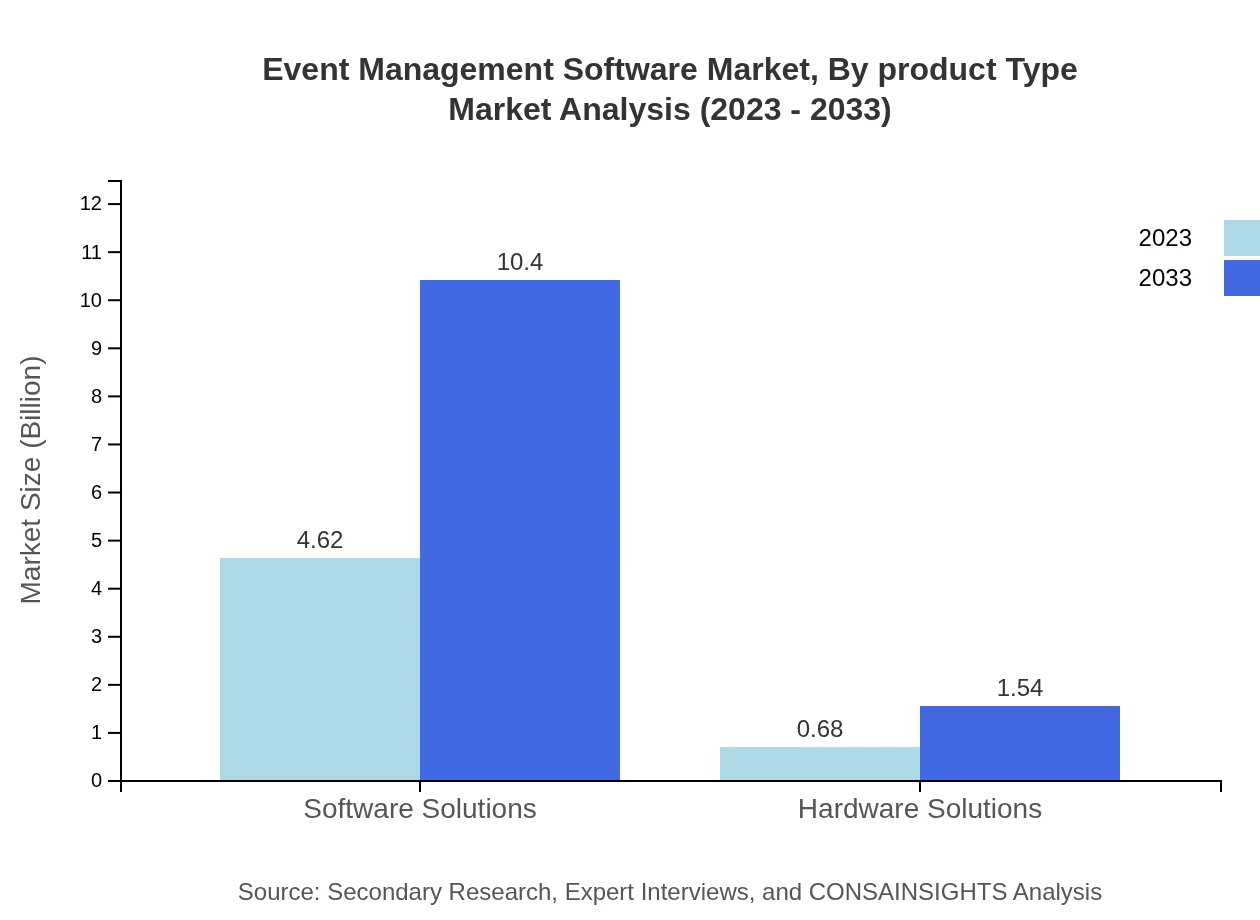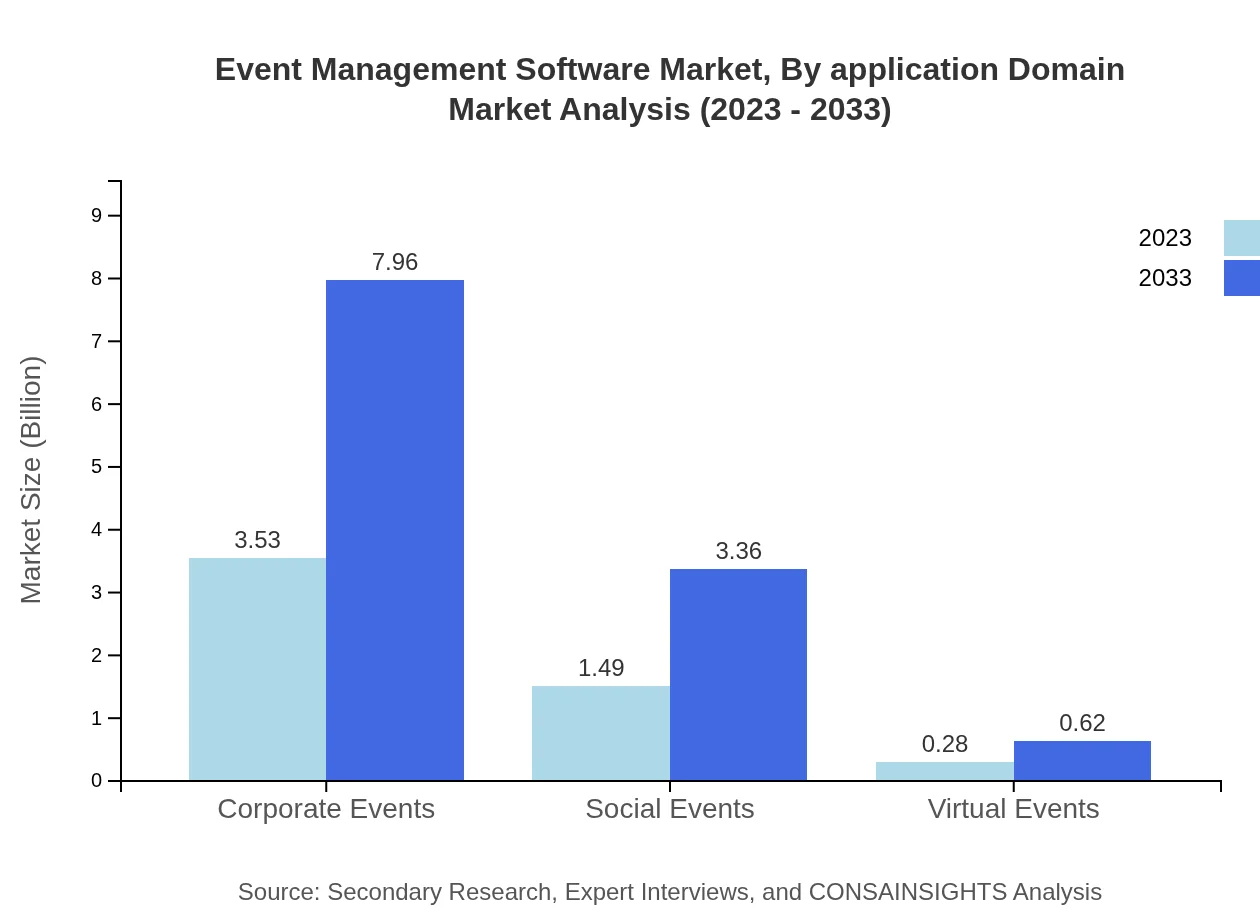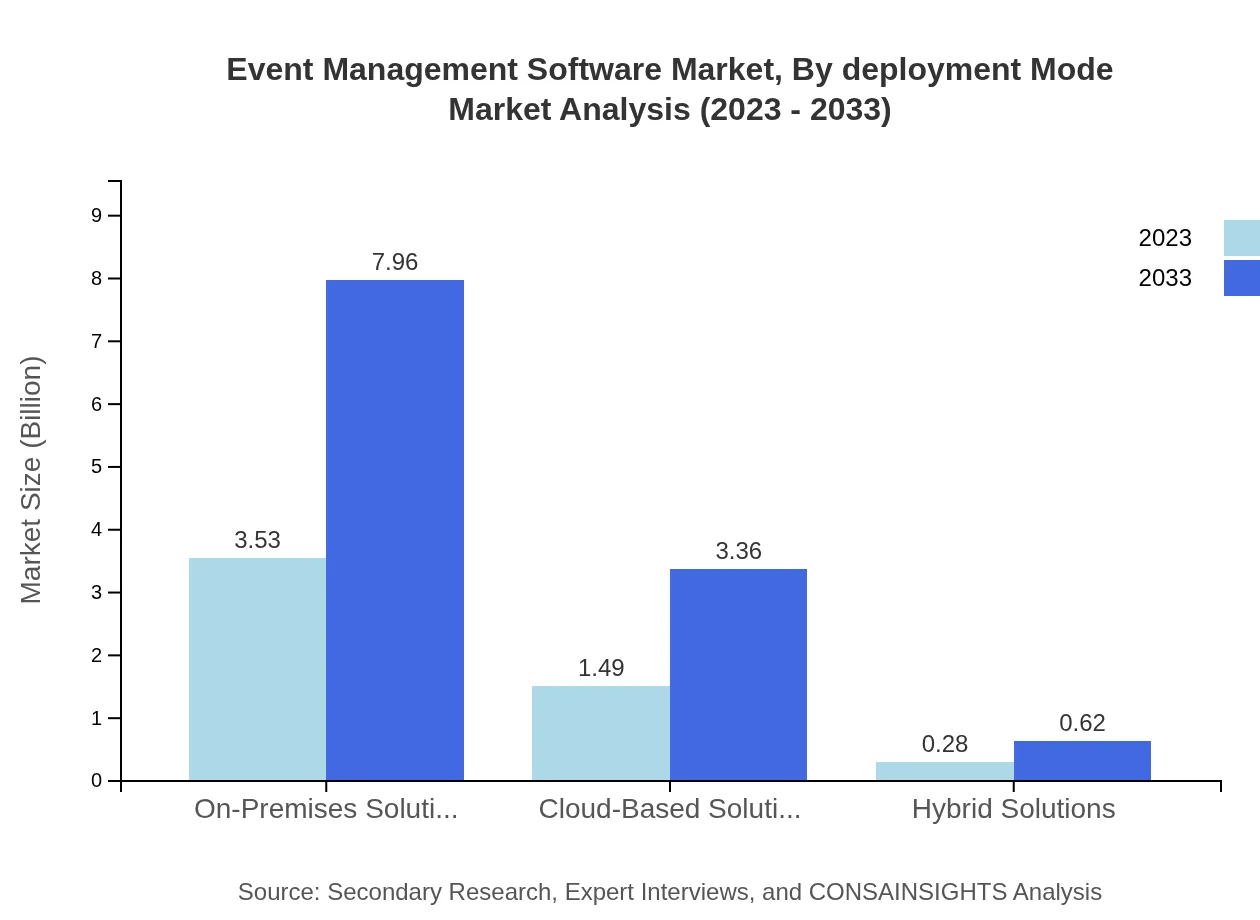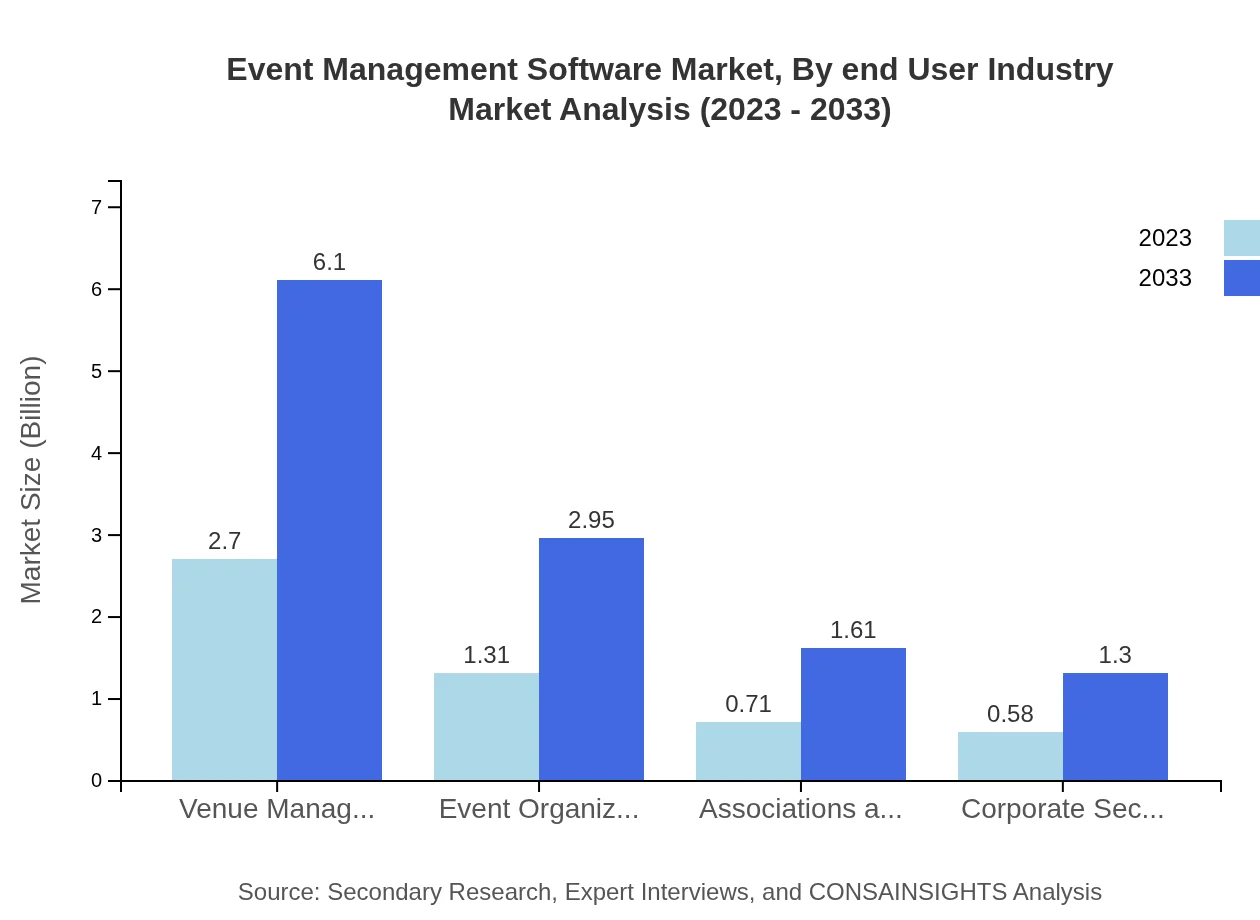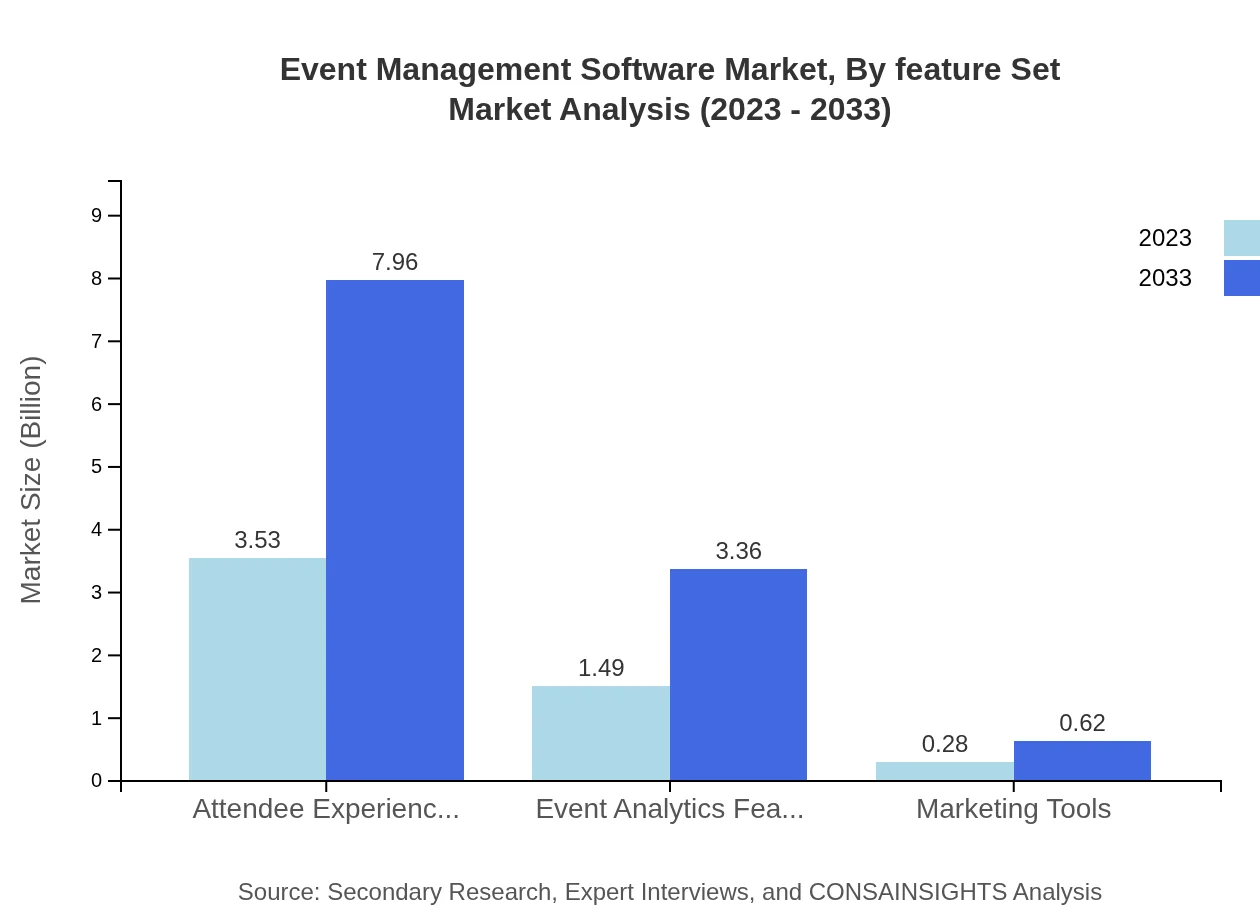Event Management Software Market Report
Published Date: 31 January 2026 | Report Code: event-management-software
Event Management Software Market Size, Share, Industry Trends and Forecast to 2033
This report provides an in-depth analysis of the Event Management Software market from 2023 to 2033, covering market insights, size forecasts, regional analyses, and future trends that shape the industry.
| Metric | Value |
|---|---|
| Study Period | 2023 - 2033 |
| 2023 Market Size | $5.30 Billion |
| CAGR (2023-2033) | 8.2% |
| 2033 Market Size | $11.95 Billion |
| Top Companies | Cvent, Eventbrite, Bizzabo, Whova |
| Last Modified Date | 31 January 2026 |
Event Management Software Market Overview
Customize Event Management Software Market Report market research report
- ✔ Get in-depth analysis of Event Management Software market size, growth, and forecasts.
- ✔ Understand Event Management Software's regional dynamics and industry-specific trends.
- ✔ Identify potential applications, end-user demand, and growth segments in Event Management Software
What is the Market Size & CAGR of Event Management Software market in 2023?
Event Management Software Industry Analysis
Event Management Software Market Segmentation and Scope
Tell us your focus area and get a customized research report.
Event Management Software Market Analysis Report by Region
Europe Event Management Software Market Report:
Europe is projected to expand from $1.53 billion in 2023 to $3.45 billion by 2033. The region shows strong growth as businesses increasingly recognize the importance of well-managed events to boost engagement and productivity.Asia Pacific Event Management Software Market Report:
The Asia Pacific region is projected to grow from $1.02 billion in 2023 to $2.30 billion in 2033, driven by the increasing number of events and a growing middle class that is more inclined to participate in experiences. Countries like India and China are significant contributors, as the demand for professional event management services rises.North America Event Management Software Market Report:
North America leads the Event Management Software market, growing from $1.72 billion in 2023 to $3.87 billion in 2033. The region benefits from high expenditure in corporate events and technological innovations, with organizations adopting advanced software solutions for event management.South America Event Management Software Market Report:
In South America, the market is expected to grow from $0.31 billion in 2023 to $0.70 billion in 2033. The development of the tourism sector and the increasing number of corporate and social events are primary factors driving this growth.Middle East & Africa Event Management Software Market Report:
The Middle East and Africa market is expected to grow from $0.73 billion in 2023 to $1.64 billion in 2033. An uptick in the corporate sector and the revival of business travel post-pandemic contribute to the increasing demand for Event Management Software in this region.Tell us your focus area and get a customized research report.
Event Management Software Market Analysis By Product Type
Software solutions dominate the market, making up approximately 87.08% of the total revenue in 2023, valued at $4.62 billion. Hardware solutions are significantly smaller at 12.92% but remain essential for certain types of events that require physical equipment.
Event Management Software Market Analysis By Application Domain
Corporate events represent the largest share, accounting for 66.66% of the market in 2023, while social events and virtual events follow. This distribution reflects the corporate sector's heavy investment in event management to enhance brand engagement.
Event Management Software Market Analysis By Deployment Mode
On-premises solutions accounted for 66.66% of the market share in 2023. However, cloud-based solutions are gaining traction, currently comprising 28.12% of the market share as organizations seek flexibility and scalability.
Event Management Software Market Analysis By End User Industry
The corporate sector contributes a significant portion, at approximately 10.87% market share in 2023, while associations and nonprofits also play a critical role, highlighting the diverse applications of event management software across industries.
Event Management Software Market Analysis By Feature Set
Hands-on features such as attendee experience tools and event analytics make up a substantial part of the market, indicating a shift towards maximizing user engagement and understanding event performance.
Event Management Software Market Trends and Future Forecast
Tell us your focus area and get a customized research report.
Global Market Leaders and Top Companies in Event Management Software Industry
Cvent:
Cvent is a leading software provider specializing in event management and hospitality solutions, known for its powerful online event registration, venue selection, and marketing tools.Eventbrite:
Eventbrite facilitates ticketing and event registrations online, creating a seamless experience for both organizers and attendees, and is prominent for its user-friendly platforms.Bizzabo:
Bizzabo offers a comprehensive event success platform, bringing together event management, marketing, and analytics to help organizations create engaging experiences.Whova:
Whova is recognized for its mobile event app that enhances attendee engagement through networking opportunities, personalized schedules, and event reminders.We're grateful to work with incredible clients.









FAQs
What is the market size of event Management Software?
The global Event Management Software market is valued at $5.3 billion in 2023, with a projected CAGR of 8.2% leading to significant expansions by 2033.
What are the key market players or companies in this event Management Software industry?
Key players in the event management software market include major companies and platforms that provide comprehensive solutions for event planning and management, contributing to market innovation and technology advancements.
What are the primary factors driving the growth in the event Management Software industry?
Increasing demand for streamlined event planning, technological advancements, and the rise in corporate events and social gatherings are significant factors driving market growth.
Which region is the fastest Growing in the event Management Software?
The Asia Pacific region is experiencing rapid growth, projected to increase from $1.02 billion in 2023 to $2.30 billion by 2033, showcasing its thriving event management landscape.
Does ConsaInsights provide customized market report data for the event Management Software industry?
Yes, ConsaInsights offers tailored market reports, providing insights specific to client needs within the event management software industry, ensuring relevant data and analytics.
What deliverables can I expect from this event Management Software market research project?
Deliverables include comprehensive reports, market analysis, trend assessment, and data segmentation, giving you in-depth insights into the event management software landscape.
What are the market trends of event Management Software?
Trends include increasing adoption of cloud-based solutions, rise in digital event platforms, and enhanced attendee experience features, as well as a growing shift towards hybrid event models.

